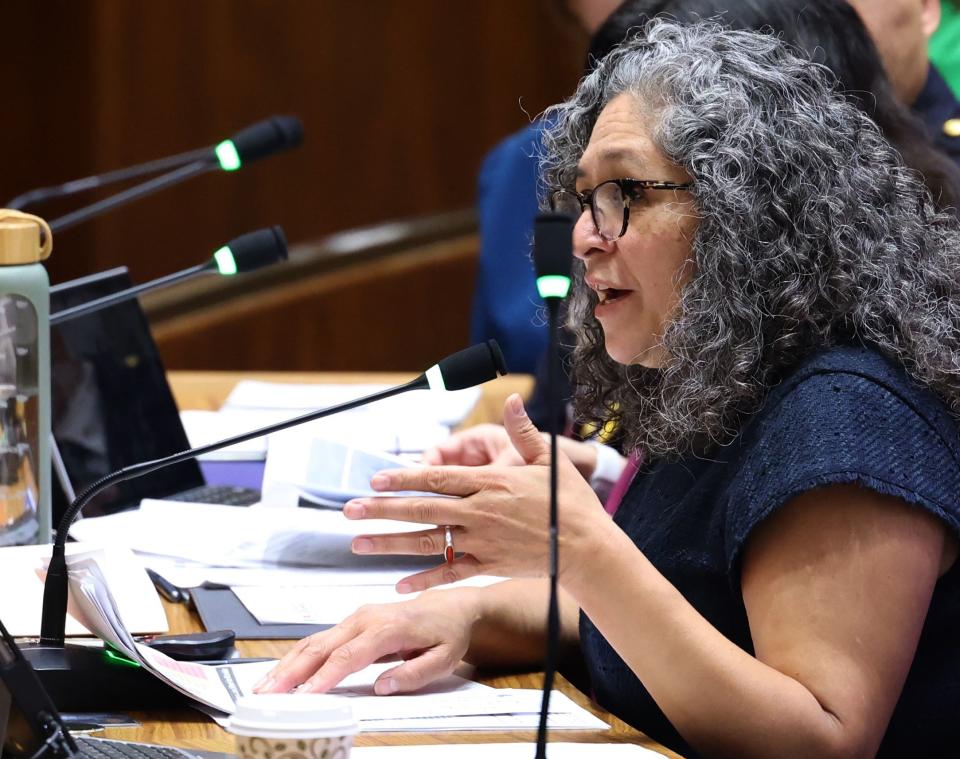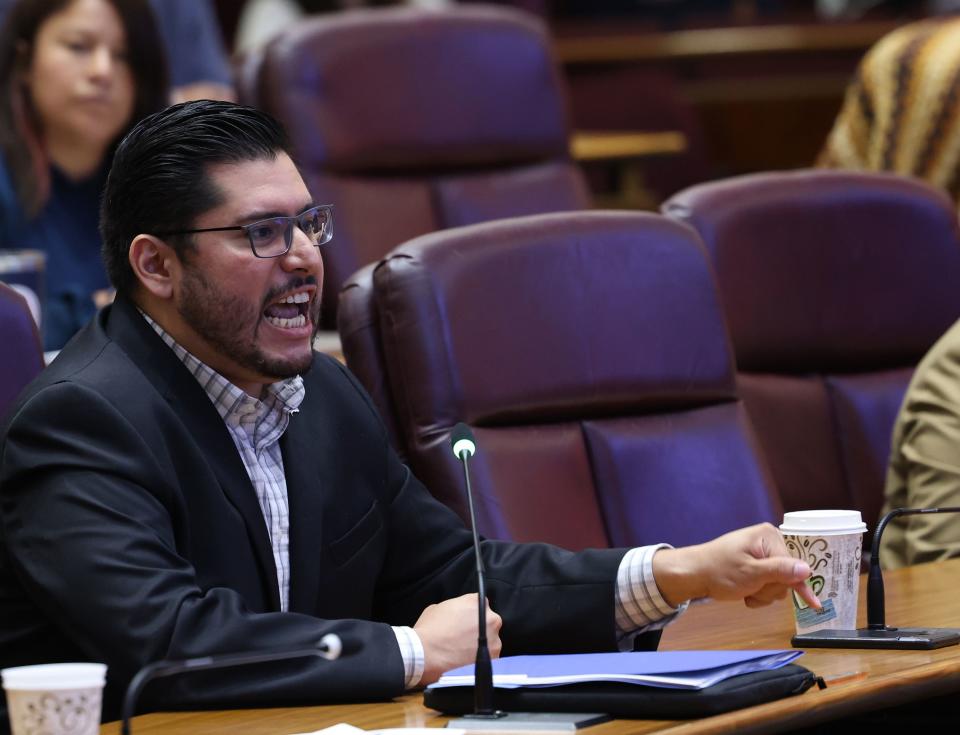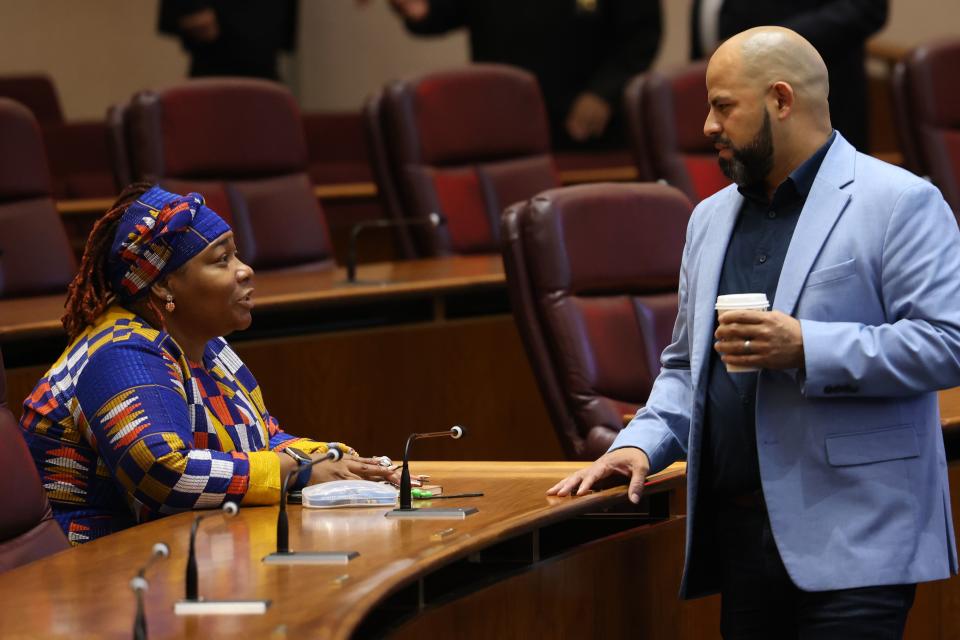Some allies break with Mayor Brandon Johnson over migrant response
- Oops!Something went wrong.Please try again later.
- Oops!Something went wrong.Please try again later.
Multiple allies broke with Mayor Brandon Johnson on Friday over his plans to temporarily house thousands of migrants in tent encampments across the city, while Johnson’s administration continued to blame Gov. J.B. Pritzker for not doing enough to help the city cope with the crisis.
During a tense meeting of the City Council’s immigration committee, three of Johnson’s hand-picked committee chairs criticized the mayor’s response to the migrant situation, including his plan to utilize a controversial private security firm to establish tent encampments for some of the more than 15,000 migrants who have been bused or flown to Chicago from southern border states since August 2022.
Several public speakers disrupted the session with boisterous arguments that the city was putting the interests of migrants over those of Black communities, a sentiment with which several aldermen from the South and West sides said they sympathized.
Resentment was also voiced against Pritzker, who critics say hasn’t provided enough state help to shelter migrants.
Ald. Andre Vasquez, 40th, opened the meeting by criticizing the city’s contract with GardaWorld Federal Services, which has been at the center of controversies over its handling of migrants elsewhere, and its subsidiary Aegis Defense Services to run the base camps.
“I am saddened by the possibility that we are on the precipice of this administration moving forward with building military grade tent base camps in our great city. I have been and will remain on record as being in disagreement with that decision,” Vasquez said. “The elected representative in me, on the other hand, recognizes that in order for us to be successful, we as a municipal government have to come together to move our city forward.”
Two of Johnson’s other committee heads — Education Chair Ald. Jeanette Taylor and Police and Fire Chair Chris Taliaferro — rejected the base camp strategy as well and said Black communities in their wards are being asked to accept migrant shelters in their neighborhoods after centuries of neglect.
Taylor, 20th, loudly demanded that the city “Stop putting them in our community.”
“What y’all doing is you’re going to start a race war. That’s what you’re doing,” Taylor said. “This is going to be a race war because y’all choosing who you’re taking care of.”
Taylor also complained about money from Black taxpayers going to what she said were wasteful contracts for sheltering the migrants. Johnson’s deputy chief of staff, Cristina Pacione-Zayas, a former state senator, responded by noting the previous administration was piggybacking off existing state’s contracts. She also signaled interest in amending the city’s long procurement process, which she blamed for limiting the city’s options.
Johnson’s administration has pushed back against detractors of the city’s $29.4 million contract with GardaWorld to establish tent camps for migrants. The firm has come under fire from several aldermen and left-leaning organizations because of questions about its migrant-related projects and proposals in Denver, Texas and Canada, as well as the firm’s recent contract to relocate asylum-seekers from Florida under the direction of Republican Gov. Ron DeSantis, who’s running for his party’s presidential nomination. The company said last week it has not provided those services thus far.
Chicago was able to quickly sign a contract with GardaWorld because the company late last year signed a $125 million master contract with the Illinois Emergency Management Agency. The agency has said the contract was awarded through competitive bidding.
“There was a contract that the state has started, we had to jump on it because at this point there are no other approved vendors,” Pacione-Zayas said at Friday’s hearing.
Taylor responded, “Just cause we can do it doesn’t mean it’s OK. … This is a problem, and you got everybody in this audience — Black, brown — saying no to this (GardaWorld) contract. So why are we going through with it?”
Ald. Taliaferro, 29th, said the migrant situation is fraying the relationship between the Black and Latino communities.
“I’m hoping you guys can see this in the placement of shelters,” Taliaferro said. “Yes, we have to have compassion, but we have to make smart moves as well. … You’re not fixing the situation, and in fact I believe you’re making it even worse.”
Some mayoral allies gave impassioned defenses of Johnson, saying he has been given an impossible challenge with virtually no support from the state or federal government.
Johnson’s floor leader, Ald. Carlos Ramirez-Rosa, 35th, ramped up his attacks on Pritzker, who a day earlier had criticized the mayor’s base camp strategy.
“I get frustrated because I wonder how many of Gov. J.B. Pritzker’s senior staff are scouting locations on a daily basis to make sure that we’re living up to our responsibility as a sanctuary state,” Ramirez-Rosa said.
He faced Pacione-Zayas and asked if, other than the proposed CVS shelter in Little Village that has yet to open, the state has offered to help open any migrant shelters in Chicago since Johnson took office. She said, “No.”
“I want that to hang in the air,” Ramirez-Rosa said. He repeated the question to her then said: “No. No. That is shameful. That is shameful because we are a welcoming state. Because this governor says that he supports migrants. … And I know why our mayor hasn’t gone out there and called the governor out. But I will be.”
The governor’s office declined to comment on Ramirez-Rosa’s criticism, but two press aides took to social media to highlight the roughly $328 million the state has spent to date on the migrant relief effort.
Late Friday, the Pritzker administration announced Chicago will receive the bulk of $42.5 million set aside in this year’s state budget to assist local governments with migrant relief efforts.
The city will receive nearly $30.3 million from the pool of funds from the Illinois Department of Human Services “for the provision of basic services to new arrivals,” such as shelter and housing support, food, legal aid and health care. The agency partnered with the Metropolitan Mayors Caucus in selecting recipients of the funds.
The state’s announcement provided no specifics on the plans the city and other local governments submitted in applying for the money. In addition to Chicago, Joliet was awarded $8.6 million, Elgin nearly $1.3 million, Lake County $1 million, Urbana $250,000 and Oak Park $150,000. The remaining $1 million is going to the Metropolitan Mayors Caucus for administering the grants.
State officials earlier have said Mayor Lori Lightfoot’s administration rejected the state’s offer to help the city set up a shelter in a former Kmart store in the West Lawn neighborhood, which state records show could have housed up to 1,400 migrants. Pritzker on Thursday noted that the state had previously sheltered migrants at several suburban hotels, while also acknowledging that was not a long-term solution.
Ramirez-Rosa’s praise for the mayor was echoed by Johnson’s Finance Committee Chair Ald. Pat Dowell, who said that Johnson is “leading with compassion.”
But she also acknowledged the racial tensions of the situation.
“I think this crisis is eating away at the goodwill of the people of the city of Chicago,” Dowell, 3rd, said. “Just like we’re talking about the migrant crisis, we have to talk about the crisis in the Black community.”
The meeting began with a presentation that underscored the humanitarian crisis surrounding the asylum-seekers, who continue to get sent to Chicago from Texas and other southern states. Nine buses were scheduled to arrive in the city Friday, Deputy Immigration Mayor Beatriz Ponce de León said, with 10 more expected Saturday.
A volunteer director of the health team responding to migrant medical emergencies also spoke and underscored the plights many migrants have gone through to get to America. Ambulances were called to Chicago police stations sheltering migrants 365 times in August — with the same number of calls coming just last week alone.
“We are seeing children who have been cut up by barbed wire in rivers, sloppily stitched up in Texas, who are put on the bus by Texas, and then dropped off and deposited into Chicago police stations with their cuts infected,” said Sara Izquierdo, a medical student at University of Illinois at Chicago.
Izquierdo said women have miscarried after arriving in the U.S. She also spoke of the young girl who died while en route to Chicago last month.
“I keep thinking about, what if she got here, what if my team had seen her?” she said. “What if we were able to do something?”
ayin@chicagotribune.com



